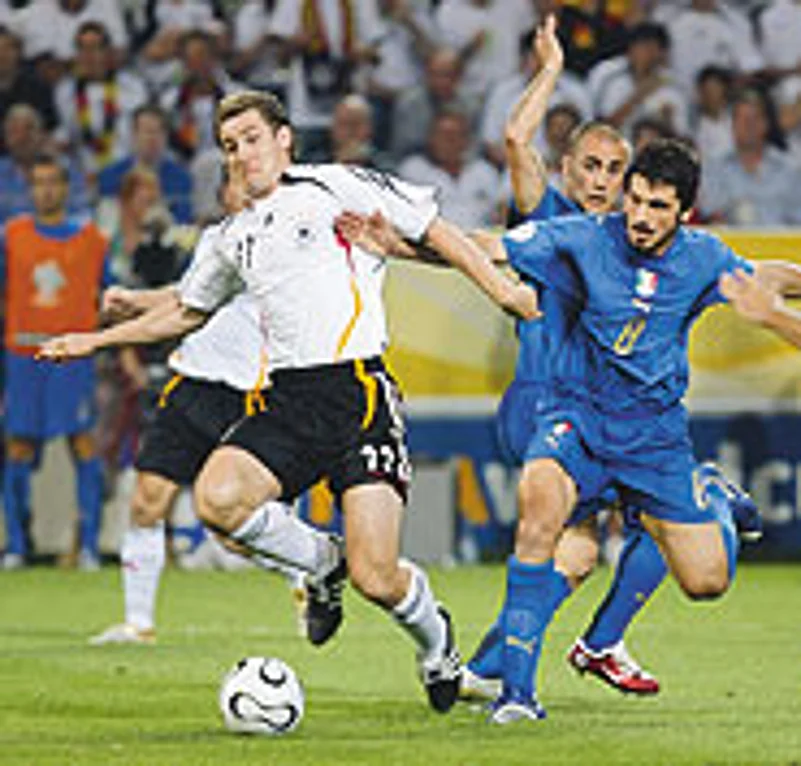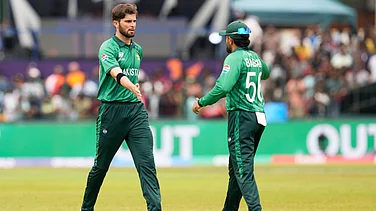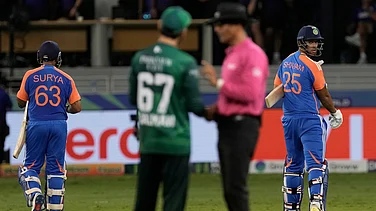In all the predictions and punditry that takes place in the 12 months before a World Cup, hardly anyone expected to see an all-European final in the 2006 edition. It became obvious as soon as Argentina and Brazil exited the quarter-finals. Even so, France and Italy have been surprising finalists. France was booed in its opening game against South Korea and generally regarded as has-beens too old to make much of an improvement on its dismal performance in Japan and Korea four years ago. Italy arrived in Germany mired in controversy over a match-fixing scandal back home, with coach Marcelo Lippi and goalkeeper Gianluigi Buffon both involved in the police investigation surrounding Juventus and their alleged practice of choosing their own referees.
But that's the whole attraction of football. It is what happens on the pitch that counts, not what people say or what is happening back home. Both France and Italy rediscovered their traditional football virtues in this World Cup. Zinedine Zidane, Claude Makelele, Patrick Vieira and Fabien Barthez have all toyed with the idea of retirement, but why bother when you can still play this well? Blessed with Thierry Henry's pace and finishing, and able to introduce the impressive Franck Ribery, France has proved a solid blend of youth and experience. Maybe the football has not been quite as fluent as when it won the Cup in 1998, but the solidity is better than ever; Brazil could not score a goal against it.
Italy has always prided itself on defending professionally and capably and its back four in this competition, led by the peerless Fabio Cannavaro, has been a wonder to behold. Italy had a defender dismissed against Australia, yet the Socceroos couldn't score. Cannavaro lost his partner Alessandro Nesta to injury early on in the tournament and despite being far from the tallest centre back around, the Italian captain simply grew in stature. Not much got past him and the only worry for Sunday, with two such formidable defences, is that the final might produce very few goals. We shall see.
Penalties are such an anti-climax. Dramatic, for sure, but an unsatisfactory way to conclude such a massive tournament. If you asked me for my tip before the final, you'd have heard me back Italy. I was impressed by the way it created two very good goals when it needed to in the final minutes of its semifinal against Germany. It knew the host would be favourites in a shootout, so it used three attacking substitutes and won the game with a few seconds of extra time to spare.
The last week of a World Cup is always brutal. While two sets of players fulfil their boyhood dreams of reaching the final, six go home with their dreams in tatters. After the extended and relatively undemanding group stage, the sudden cull of the final week comes as something of a shock when big teams and pre-tournament favourites start to fall.

Shock was certainly the word to describe Argentina's exit. One minute it was a goal up against Germany and in the next found itself in a penalty shootout against a team that never loses penalty shootouts. The Germans duly prevailed and Jose Pekerman was left to face the wrath of his country after failing to get Lionel Messi on to the pitch. Messi was supposed to become one of the players of the tournament; even from the substitutes' bench he managed to make an impact in earlier rounds. But in the quarter-final, an injury to goalkeeper Roberto Abbondanzieri made the Argentina coach overcautious. He first used one of his three substitutions to replace his goalie, then decided to protect his one goal lead while preserving Juan Roman Riquelme for the semi-final. Big mistake.
Pekerman should have first ensured his team was in the semis. When Germany equalised, Argentina had three of its best attackers on the bench, the withdrawn Riquelme and Hernan Crespo as well as the unused Messi Pekerman's defensive substitutes could not manage to win the game all over again and where Crespo would probably have scored his penalty, his replacement Esteban Cambiasso missed. Pekerman resigned immediately and it is already being said that he'll need to move to a very remote part of Patagonia if he wishes to continue living in peace.
The Brazilian exit was less surprising. It was never really convincing in this Cup and was unable to score against an accomplished, experienced French team. Zidane still inspires France but when Brazil looked to Ronaldo or Ronaldinho to provide the old magic, none was forthcoming. Brazil is notorious for doing the minimum in the early stages of World Cups, almost coasting, then raising the tempo when the pressure is on. Not this time. Ronaldo and Adriano looked old and heavy; Kaka and Ronaldinho met their match in Makelele and Vieira in the French midfield. Brazil looked short of ideas and fitness, for which coach Carlos Alberto Parreira must take the blame. Gary Lineker once said his granny could win a World Cup with Brazil. Here was proof she perhaps couldn't.
Luiz Felipe Scolari, the coach Lineker was talking about, won with Brazil four years ago, and is now in charge of Portugal. His streak of 12 unbeaten matches in World Cup finals was beaten this time by France. Unlucky 13 if you like, though luck had very little to do with it. Portugal spent too much time trying to win free kicks and penalties instead of taking the game to France. And when it did create chances, it wasted them. Scolari will just have to be content with a European Championship final and a World Cup semifinal to add to his achievements with Brazil. Not a bad record and had he taken Portugal to the final, he'd unquestionably have been coach of the tournament. No wonder England wanted him.
Oh yes, England. Of the teams with realistic hopes of winning the tournament, England was much, much worse than anyone anticipated. With what's supposed to be a golden generation of players, it put in its worst World Cup performance since winning the trophy 40 years ago. People were expressing disbelief. Mainly because England was paying Sven-Goran Eriksson close to £5 million a year to supervise this.
Eriksson thought he would apply some continental sophistication to the courage and commitment. He failed big time. England was not at the races at this World Cup which came as quite a shock to all those who rate the Premiership very high. The French could soon have two stars on their shirts; that would be another. England's lone World Cup success is beginning to look as remote and as hard to believe as Beatlemania. It might prove just as impossible to repeat.


























